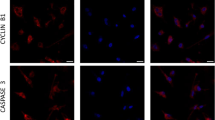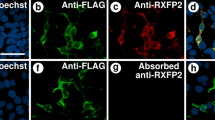Abstract
Epidermal growth factor (EGF) and insulin-like growth factor I (IGF-I) have been shown to regulate Leydig cell steroidogenesis in several species. We have investigated the effects, if any, of EGF and IGF-I on in vitro testosterone production of human Leydig cells. Interstitial cells or Percoll purified Leydig cells were isolated from the testes obtained from patients (n = 9) undergoing orchidectomies for treatment of prostate cancer and were cultured for different time periods with hCG, dibutyryl cAMP, EGF and IGF-I. Testosterone in the culture media was measured by radioimmunoassay. While EGF had a stimulatory effect on basal testosterone production of isolated interstitial cells or purified Leydig cells, IGF-I was ineffective. When the interstitial cells were cultured in the presence of hCG or EGF for 3, 6 or 24 h, the stimulatory effects of EGF on testosterone production were only evident after 24 h. On the other hand, hCG stimulated testosterone production at all time points (i.e after 3, 6, 24 h of incubation). When added in the presence of maximal concentrations of hCG and dibutyryl cAMP, EGF did not further enhance steroidogenesis. On the other hand, IGF-I potentiated the effects of hCG on testosterone production. These studies suggest that EGF and IGF-I may play a regulatory role in steroidogenic function of the human testes.
Similar content being viewed by others
References
Hsueh A.J.W., Welsh T.H., Jones, P.B.C. Inhibition of ovarian and testicular steroidogenesis by epidermal growth factor. Endocrinology 108: 2002, 1981.
Verhoeven G., Cailleau J. Stimulatory effects of epidermal growth factor on steroidogenesis in Leydig cells. Mol. Cell. Endocrinol. 47: 99, 1986.
De Mellow J.S.M., Handelsman D.J., Baxter R.C. Short-term exposure to insulin-like growth factors stimulates testosterone production by testicular interstitial cells. Acta Endocrinol. (Copenh.) 115: 483, 1987.
Lin T., Haskell J., Vinson N., Terracio L. Direct stimulating effects of insulin-like growth factor-1 on Leydig cell steroidogenesis in primary culture. Biochem. Biophys. Res. Commun. 137: 950, 1986.
Benahmed M., Morera A.M., Chauvin M.C., de Peretti E. Somatomedin C/insulin-like growth factor 1 as a possible intratesticular regulator of Leydig cell activity. Mol. Cell. Endocrinol. 50: 69, 1987.
Baranao J.L.S., Hammond J.M. Comparative effects of insulin and insulin-like growth factors on DNA synthesis and differentiation of porcine granulosa cells. Biochem. Biophys. Res. Commun. 124: 484, 1984.
Adashi E.Y., Resnick C.E., Brodie A.M.H., Svoboda M., Van Wyk J.J. Somatomedin-C mediated potentiation of follicle-stimulating hormone induced aromatase activity of cultured rat granulosa cells. Endocrinology 177: 2313, 1985.
D’Ercole A.J., Stiles A.D., Underwood L.E. Tissue concentration of somatomedin C: further evidence for multiple sites of synthesis and paracrine or autocrine mechanisms of action. Proc. Natl. Acad. Sci. USA. 81: 935, 1984.
Handelsman D.J., Spaliviero J.A., Scott C.D., Baxter R.C. Identification of insulin-like growth factor I and its receptors in the rat testis. Acta. Endocrinol. (Copenh.) 109: 543, 1985.
Hall K., Ritzen E.M., Johnsonbaugh R.E., Parvinen M. Pubertal rise of immunoreactive somatomedin and its eventual source. In: Spencer E.M. (Ed.), Insulin-like growth factors-Somatomedins. De Gruyter, New York, 1983, p 611.
Tres L.L., Smith E.P., Van WyK J.J., Kierszeubaum A. Immunoreactive sites and accumulation of somatomedin C in rat Sertoli-spermatogeneic cell cocultures. Exp. Cell. Res. 162: 33, 1986.
Borland K., Mita M., Oppenheimer C.L., Blinderman L.A., Massague J., Hall P.F., Czech M.P. The action of insulin — like growth factor I and II on cultured Sertoli cells. Endocrinology 114: 240, 1984.
Vannelli B.G., Barni T., Orlando C., Natali A., Serio M., Balboni G.C. Insulin-like growth factor (IGF-I) and IGF-I receptor in human testis: an immunohistochemical study. Fertil. Steril. 49: 666, 1988.
Baxter R.C The somatomedins: insulin-like growth factors. Adv. Clin. Chem. 25: 49, 1986.
Bernier M., Chatelain P., Mather J.P., Saez J.M. Regulation of gonadotropin receptors, gonadotropin responsiveness and cell multiplication by Somatomedin C and insulin in cultured pig Leydig cells. J. Cell. Physiol. 129: 257, 1986.
Verhoeven G., Cailleau J. A Leydig cell stimulatory factor produced by human testicular tubules. Mol. Cell. Endocrinol. 49: 137, 1987.
Khan S.A., Hallin P., Bartlett J., De Geyter Ch., Nieschlag E. Characterization of a factor from human ovarian follicular fluid which stimulates Leydig cell testosterone production. Acta Endocrinol. (Copenh.) 118: 283, 1988.
Syed V., Khan S.A., Ritzen E.M. Stage-specific inhibition of interstitial cell testosterone secretion by rat seminiferous tubules in vitro. Mol. Cell. Endocrinol. 40: 257, 1985.
Schurmeyer Th., Wickings E.J., Freischem C.W., Nieschlag E. Saliva and serum testosterone following oral testosterone undecanoate administration in normal and hypogonadal men. Acta Endocrinol. (Copenh.) 102: 456, 1983.
Murphy P.R., Moger W.H. Short term primary culture of mouse interstitial cells: Effects of culture conditions on androgen production. Biol. Reprod. 27: 38, 1982.
Meidan R., Lim P., McAllister J.M., Hsueh A.J.W. Hormonal regulation of androgen biosynthesis by primary cultures of testis cells from neonatal rats. Endocrinology 116: 2473, 1985.
Ascoli M. Regulation of gonadotropin receptors and gonadotropic responses in a clonal strain of Leydig tumor cells by epidermal growth factor. J. Biol. Chem. 256: 179, 1981.
Welsh T.H., Hsueh A.J.W. Mechanism of the inhibitory action of epidermal growth factor on testicular androgen biosynthesis in vitro. Endocrinology 110: 1498, 1982.
Erickson G.F., Case E. Epidermal growth factor antagonizes ovarian theca interstitial cytodifferentiation. Mol. Cell. Endocrinol. 31: 71, 1983.
Erickson G.F., Magoffin D.A., Dyer C.A., Hofeditz C. The ovarian androgen producing cells: A review of structure function relationships. Endocr. Rev. 6: 371, 1985.
Mondschein J.S., Schomberg D.W. Growth factors modulate gonadotropin receptor induction in granulosa cell cultures. Science 211: 1179, 1981.
Tsutsumi O., Kurachi H., Oka T. A physiological role of epidermal growth factor in male reproductive function. Science 233: 975, 1986.
Author information
Authors and Affiliations
Rights and permissions
About this article
Cite this article
Syed, V., Khan, S.A. & Nieschlag, E. Epidermal growth factor stimulates testosterone production of human Leydig cells in vitro. J Endocrinol Invest 14, 93–97 (1991). https://doi.org/10.1007/BF03350275
Received:
Accepted:
Published:
Issue Date:
DOI: https://doi.org/10.1007/BF03350275




